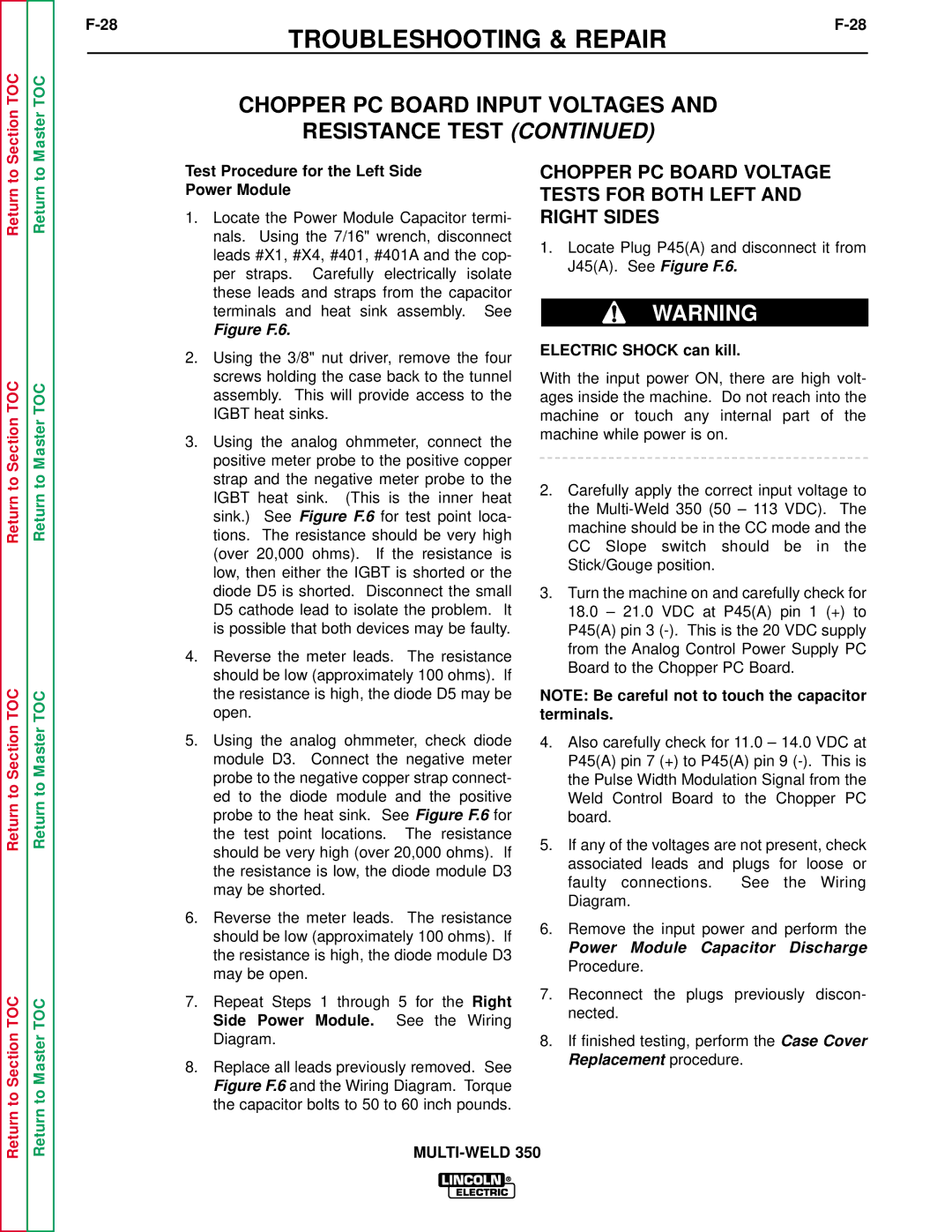
Section TOC
Master TOC
|
| TROUBLESHOOTING & REPAIR |
CHOPPER PC BOARD INPUT VOLTAGES AND
RESISTANCE TEST (CONTINUED)
Return to
Return to Section TOC
Return to Section TOC
Return to Section TOC
Return to
Return to Master TOC
Return to Master TOC
Return to Master TOC
Test Procedure for the Left Side
Power Module
1.Locate the Power Module Capacitor termi- nals. Using the 7/16" wrench, disconnect leads #X1, #X4, #401, #401A and the cop- per straps. Carefully electrically isolate these leads and straps from the capacitor terminals and heat sink assembly. See
Figure F.6.
2.Using the 3/8" nut driver, remove the four screws holding the case back to the tunnel assembly. This will provide access to the IGBT heat sinks.
3.Using the analog ohmmeter, connect the positive meter probe to the positive copper strap and the negative meter probe to the IGBT heat sink. (This is the inner heat sink.) See Figure F.6 for test point loca- tions. The resistance should be very high (over 20,000 ohms). If the resistance is low, then either the IGBT is shorted or the diode D5 is shorted. Disconnect the small D5 cathode lead to isolate the problem. It is possible that both devices may be faulty.
4.Reverse the meter leads. The resistance should be low (approximately 100 ohms). If the resistance is high, the diode D5 may be open.
5.Using the analog ohmmeter, check diode module D3. Connect the negative meter probe to the negative copper strap connect- ed to the diode module and the positive probe to the heat sink. See Figure F.6 for the test point locations. The resistance should be very high (over 20,000 ohms). If the resistance is low, the diode module D3 may be shorted.
6.Reverse the meter leads. The resistance should be low (approximately 100 ohms). If the resistance is high, the diode module D3 may be open.
7.Repeat Steps 1 through 5 for the Right Side Power Module. See the Wiring Diagram.
8.Replace all leads previously removed. See Figure F.6 and the Wiring Diagram. Torque the capacitor bolts to 50 to 60 inch pounds.
CHOPPER PC BOARD VOLTAGE TESTS FOR BOTH LEFT AND RIGHT SIDES
1.Locate Plug P45(A) and disconnect it from J45(A). See Figure F.6.
WARNING
ELECTRIC SHOCK can kill.
With the input power ON, there are high volt- ages inside the machine. Do not reach into the machine or touch any internal part of the machine while power is on.
2.Carefully apply the correct input voltage to the
3.Turn the machine on and carefully check for 18.0 – 21.0 VDC at P45(A) pin 1 (+) to P45(A) pin 3
NOTE: Be careful not to touch the capacitor terminals.
4.Also carefully check for 11.0 – 14.0 VDC at P45(A) pin 7 (+) to P45(A) pin 9
5.If any of the voltages are not present, check associated leads and plugs for loose or faulty connections. See the Wiring Diagram.
6.Remove the input power and perform the
Power Module Capacitor Discharge Procedure.
7.Reconnect the plugs previously discon- nected.
8.If finished testing, perform the Case Cover Replacement procedure.
